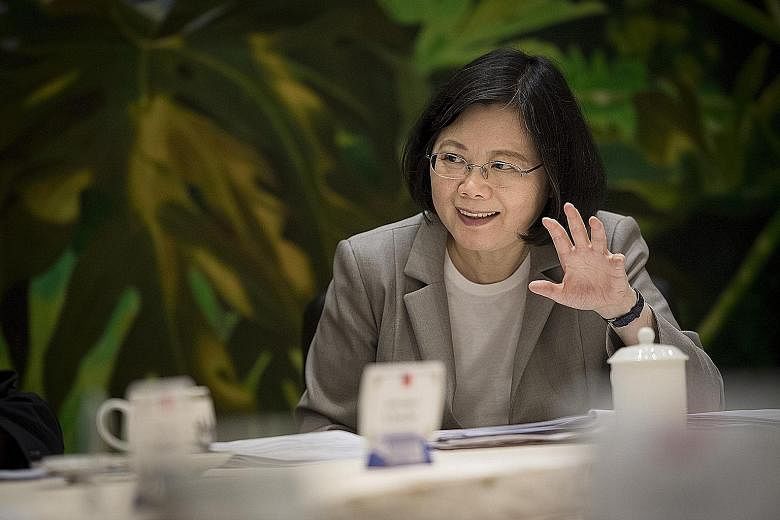Taiwan's move to "pivot south" is making progress, said Taiwanese President Tsai Ing-wen yesterday, as she made a pitch on how the island can play a bigger economic role in South-east Asia and India.
Noting a greater flow of tourists from these countries, Ms Tsai announced that Taiwan will launch five new projects to help India and Asean countries develop industrial talent and boost cooperation in medical care, innovative industries and regional agriculture development.
Speaking for the first time to Asean media as president yesterday, Ms Tsai made it clear that Taiwan's efforts to grow its presence in Asean and India, dubbed the New Southbound Policy, is "not about geopolitics".
"It is about economics and trade. So our overall objective is to strengthen Taiwan's cooperation with each country in terms of resources, talent, and markets.
"We hope to build more long-term and strategic relationships on a mutually beneficial basis," said Ms Tsai, 60, who marks her first year in office on May 20.
The NT$4.2 billion (S$195.5 million) plan, which was launched last year after she took office, aims to strengthen Taiwan's links with 18 countries in South-east Asia, South Asia, Australia and New Zealand.
This goes beyond investments and trade deals to cover cultural, tourism and educational links.
The policy is also part of the Tsai administration's efforts to diversify its flagging economy and wean itself off China, where two-thirds of its overseas investments and 40 per cent of its exports go.
Taiwan's relations with China have worsened after Ms Tsai of the independence-leaning Democratic Progressive Party took office last May. She did not acknowledge the 1992 Consensus - a tacit agreement between the two sides that there is one China - during her inauguration speech in May last year, leading Beijing to cut official contact, tourist flows and exchanges.
Yesterday, Ms Tsai went on the charm offensive, noting that she is "highly interested" in the New Southbound countries, like many people in Taiwan.
As a trade negotiator previously, she has had the opportunity to visit many of these countries, she said.
She visited India after losing the 2012 presidential election and had "quite an experience" taking a 16-hour train ride from Delhi to Mumbai, she said.
In 2013, she visited Indonesia and met young people "who were confident and ambitious".
By strengthening its presence in the Asean and India markets, Taiwan will boost its competitiveness and pave the way to go into other regional markets as well, said Ms Tsai.
"To me, it's perfectly mutually beneficial for us to make joint efforts," she added.
Ms Tsai, who fielded questions from journalists from Singapore, India, Indonesia, Malaysia, the Philippines and Thailand, also elaborated how Taiwan can flex its soft power.
These include helping countries set up new industries - like fish-farming in India or shipbuilding in Indonesia.
Taiwan also wants to help to develop talent like engineers, and research and development personnel in Taiwan's universities and training centres.
Currently, about 1,200 Indian students are studying in Taiwan, she said, adding that there are plans to further expand scholarship and fellowship awards for talented Indian students to study in Taiwan.
The Taiwanese government is also getting Taiwan's private companies to sponsor 5,000 students from Asean and India to study and work in Taiwan this year.
Another possible area of cooperation is with Taiwan's "resilient, energetic and competitive" small and medium-sized enterprises (SMEs) said Ms Tsai.
Taiwan's SMEs offer one of the best ways to tackle income inequality, she said, and Taiwan is willing to share its experiences with the New Southbound countries.
Ms Tsai is looking to Singapore, an Asean member, to help it with its efforts to develop greater trade ties with South-east countries.
"If Singapore is prepared to be in the position to help, we will be very happy to build a platform of some sort so we can make use of the Singapore experience in developing relationships with South-east Asia," she said in response to a question from The Straits Times.
Both sides can be "more pro-active" in working with each other, such as in boosting trade links, she said, describing ties as "good and healthy".
Singapore is the only Asean country which has a free-trade deal with Taipei. Known as Astep - the Agreement between Singapore and the Separate Customs Territory of Taiwan, Penghu, Kinmen and Matsu on Economic Partnership - the agreement took effect three years ago.
Singapore is Taiwan's fifth biggest trading partner, with two-way trade valued at around US$23.7 billion (S$33.3 billion) last year.
Singapore can help Taiwan better understand Asean, which her administration is courting for more business opportunities, said Ms Tsai.
Singapore could also get its think-tanks to work with their Taiwanese counterparts and the Taiwanese government to help Taiwan grow its presence in South-east Asia, she added.

